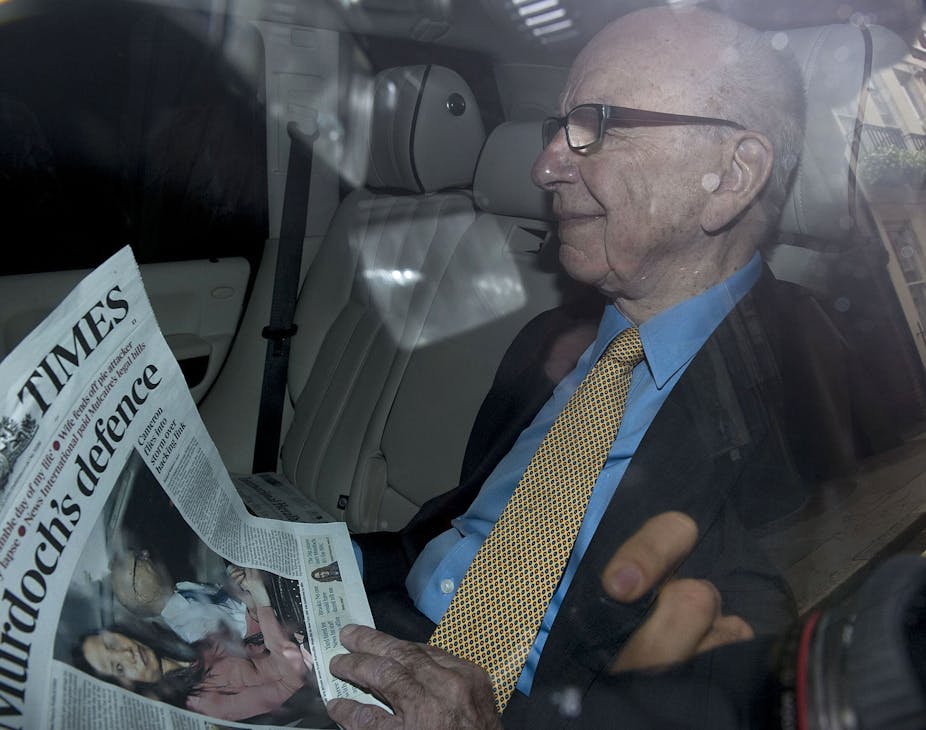In little more than two weeks, the long simmering issue of illegal phone hacking at News Corporation’s British newspaper News of the World has developed into a cascading crisis, with fatal results for the top selling Sunday newspaper, its staff and the careers of elite UK power brokers.
Initially focused on one newspaper and its regional parent company, it has claimed the careers of senior media and police executives, doggedly threatens to knock on the door of 10 Downing Street and also to make a trans-Atlantic leap to News’s U.S. entities.
But that’s only what we read in the papers and see on TV. The illegal practices involved go to the heart of personal and journalistic ethics, the right to privacy, and the abuse and neglect of power.
Under the surface, there has been an endemic corrosion of ethics, honor and propriety such that no amount of inquiries by parliament, government or the judiciary can measure the perverse degrees to which it has become a part of media’s DNA.
The illegal hacking practices revealed in recent weeks to be more widespread than originally thought have been contained by tangible evidence (11,000 pages of it) to the now defunct paper but are effecting, unfairly but through implied guilt by association, thousands of other highly professional journalists and dozens of news gathering units in the News Corp group.
Britain’s Prime Minister David Cameron – socially and professionally connected to many of the main players – has been dragged by invigorated opposition leader Ed Millibrand and public horror over the extent, insensitivity and blatant media abuse to launch a multi-faceted investigation into media practices, newspaper regulation, cross-media ownership and the relationship between press and politicians.
On one hand, the imbroglio has already led to a major house-cleaning exercise in News Corp’s UK newspaper business and that is clearly a good thing with Rupert and James Murdoch left to count the cost of near fatal damage to their local organization and possibly its global outreaches.
On the other hand, it has rudely pushed three of the four major estates in the cradle of Western democracy – parliament (1st Estate), executive government (2nd), and media (4th) – to forensically examine what over recent decades since Margaret Thatcher’s reign has been an inter-dependent, chummy, self-serving and needy relationship.
During the MPs’ expenses scandal of 2009 – uncovered by Britain’s Daily Telegraph - it was widely commented that the UK public got the politicians it deserves. The question now needs to be asked whether it also has the media it deserves, one that trashes reputations, including, ironically, its own, and thinks nothing of the cruel effects on broken lives.
The evidence of wrong doing at News of the World is incontrovertible and a sad reflection on its journalistic culture and business and management practices that allowed it to thrive. It’s well and good to hear the series of mea culpas uttered by James and Rupert Murdoch through public pronouncements and in testimony to the UK parliament’s culture select committee.
But while this period of chaos continues to deliver surprises and the watchdogs of Fleet Street monitor the big dog squirming, what does it mean in the long term for media practices and journalists’ relationships with politicians? Politicians and the press are fated to be continually locked in a love-hate relationship with “information” the commodity they covet and trade under cover of the more exalted Western democracy ideal of serving the people.
It is difficult for any media to hand-on-heart guarantee that its newsgathering style is completely free of corrupt practice. In today’s competitive media market, news outlets face a dilemma between reporting in the public interest or reporting anything that might interest the public.
Just as in Britain, Australia’s media and politicians engage in the time-honored art of badgering and abuse and it is no surprise to see Prime Minister Gillard and Greens’ leader Bob Brown reading the anti-News Corp mood and jumping on the bandwagon to call for media ownership inquiries.
But it is not in the public interest for opportunistic parliamentarians to set about rebalancing their control over the press, no matter how timely it may seem. Rigorous public debate through the media is a sign of democracy at work and any imposed restrictions on its ability to report will be to the public’s detriment.
A shackled press is anathema to a free society and no more perfect example is The Guardian’s forensic pursuit of the illegal practices of News of the World journalists when the police had closed the case. And little more than two years ago, the media’s uncovering of the MP expenses scandal showed up an earlier cohort of lawmakers to be lawbreakers. So it works both ways.
Just as in times of crisis, such as 9/11, nuclear accidents, tsunamis and earthquakes, the public counts on the media to make sense of chaos. Professional media outlets in the UK are making sense of the corruption of one of their own and how far it has affected other arms of society.
In the bigger picture of a globalised media, the News of the World crisis is a mighty wake-up call to the minority of lax and corruptible journalists and the politicians and police they sup with. While journalists must be left free to go about their business, institutions such as their employers and the public need to rigorously police their practices to reflect community standards.

